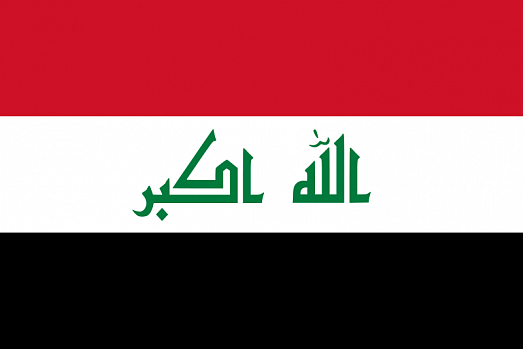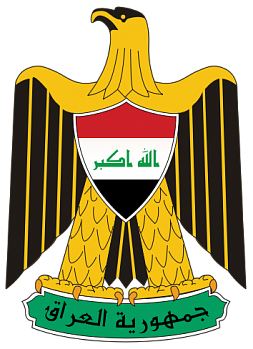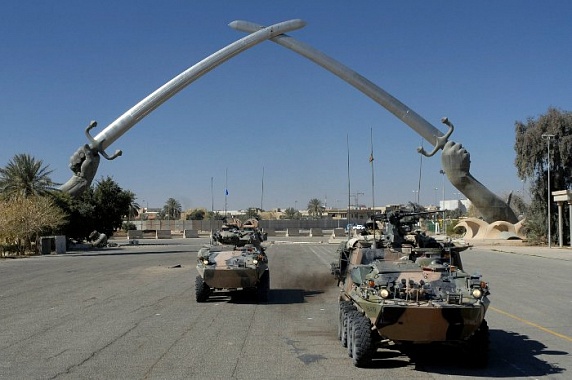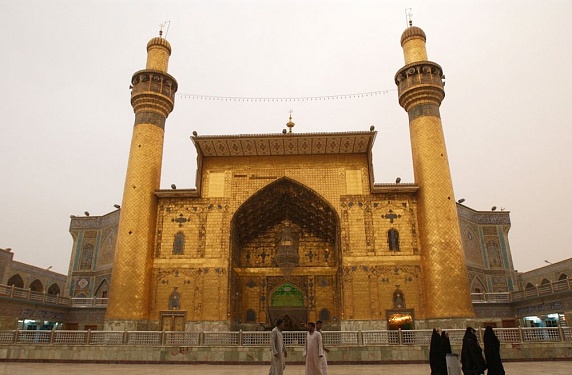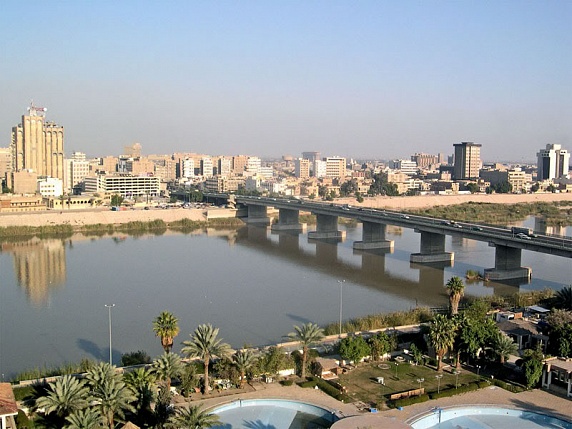 the Republic of Iraq
the Republic of Iraq
Russian Ambassador to Iraq Maxim Maksimov’s interview with Interfax news agency, April 14, 2020
Question: The coronavirus is currently in the focus of the world’s attention. How can you explain that there are relatively few cases in Iraq? Does the country have enough medical supplies and equipment?
Maxim Maksimov: It is true that the numbers are small compared to the main infection hotbeds such as the United States, Spain, Italy or neighbouring Iran. However, Iraq has the third highest number of fatalities from this disease among Arab countries, according to official data. The Iraqi government has gone to great lengths to counter the spread of the virus and normalise the sanitary and epidemiological situation in the country. It is assisted in its efforts by other countries, primarily China, which has sent several shipments of protective and medical equipment, as well as doctors for staffing Iraqi hospitals.
However, healthcare workers are still under growing pressure, even though the situation with equipping medical facilities has been improving and more specialised laboratories have opened. Iraqi and international experts believe that the outbreak has yet to reach its peak in the country, and the virus continues to spread, mostly due to widespread violations of the lockdown regime. The Iraqi law enforcement agencies are releasing daily updates on the number of people who were apprehended and fined. These figures are not even in the thousands, but in the tens of thousands.
Question: In view of the recent escalation in the relations between the United States and Iran, do you believe that Iraq adopted a constructive position, considering that the country was once again mentioned as a “battleground” where the stand-off between the United States and Iran could play out? Do you have a feeling that Washington and Tehran could use Iraq as an arena for settling their scores?
Maxim Maksimov: I can assure you that the Iraqi Government has stated on multiple occasions its principled commitment to developing balanced relations with all its foreign partners, including the United States and Iran. The country’s leadership believes that the confrontation that has been unfolding between the two countries over the past year has had an extremely negative impact on the situation in the region as a whole, as well as in Iraq. In this context, the government has been taking consistent steps to improve the situation in the Gulf, overcome division and restore trust between the Islamic Republic of Iran and countries from this sub-region, primarily Saudi Arabia. There is a clear understanding in Baghdad that Washington’s aggressive actions towards Tehran, including in Iraqi territory, could have catastrophic consequences, both humanitarian and economic. I am referring, among other things, to the January 3 attack against the Baghdad Airport to kill the Commander of the Islamic Revolutionary Guard Corps, Qasem Soleimani, as well as Deputy Chairman of Popular Mobilisation Committee Abu Mahdi al-Muhandis.
It has to be noted that the Iraqi government has shown formidable restraint against the backdrop of these challenging developments. It put into motion legal and diplomatic tools at all levels, including within the United Nations, to call on Washington and Tehran to settle their differences around the negotiating table. It is also worth noting that the current Iraqi leadership has been consistent in its policy to promote equidistant partnerships with all members of the international community based on the principles of neighbourly relations, mutual respect and mutually beneficial cooperation. In this context, Iraq’s commitment to promoting peace are in sync with the main principles set forth in Russia’s Collective Security Concept for this sub-region, which prioritises dialogue for resolving problems it faces.
We believe that attempts by some countries to use Iraq as a platform for settling their scores is unacceptable. Actions of this kind run counter to the international law and violate the sovereignty of an independent state. We have to remember that Iraq remains a major political, economic, cultural and religious centre in the Middle East. For this reason, preserving peace and stability in this country is an important prerequisite for ensuring regional and global security.
Question: What do you think of NATO's plans to expand the alliance's mission in Iraq?
Maxim Maksimov: We firmly believe that the presence of foreign contingents in the territory of independent states should be founded on appropriate legal basis ̶ otherwise it is a violation of the country's sovereignty. As far as I know, the legal status of the NATO mission in Iraq is still being coordinated, although NATO instructors have conducted training activities there since January 2019. Indeed, media reports have started to emerge saying that the alliance is seeking to expand its mission in this Arab country, with negotiations with the Iraqi government currently underway. In any case, this issue concerns solely the Iraqi authorities and it is up to them to make a decision as to whether NATO's assistance is feasible and relevant.
Question: Have there been changes in oil production volumes in recent months amidst the current situation in the oil market and with the COVID-19 pandemic? How do the Iraqi authorities view the recent OPEC+ talks?
Maxim Maksimov: The situation that has been unfolding in the global hydrocarbons market is having a dramatic effect on the oil and gas sector and Iraq's economy in general. The local government is seriously concerned about the plunge in oil prices following the OPEC+ talks in Vienna in March. Official figures posted monthly by the Iraq National Oil Company of the country's Ministry of Oil speak for themselves: with equal oil production volumes of 133̶ 134 million barrels in February and March this year and oil shipments of 102̶ ̶105 million barrels, oil revenues fell by 40.8 percent in March, totalling $2.9 billion against $5.05 billion in February. As is the case with other oil producing countries, whose budgets are directly dependent on oil sales, this is fraught with serious consequences in the foreseeable future.
Along with the pressing issues related to the shortfall in oil revenues, the current situation has posed substantial risks to Iraq's oil and gas industry, which has been reviving following many years of instability in the region. According to many foreign and local experts, the country's authorities will have to take urgent measures to secure the oil sector's financial stability and its competitiveness at any price levels, as well as to ensure it can retain its share in the global oil market amidst a tough price war between major suppliers.
As regards OPEC+ extra round of talks on April 9, it should be noted that the Baghdad authorities have always consistently spoken for further coordinating efforts within this mechanism, and stressed the need for reaching new agreements between member states.
The agreement reached on oil production cuts will definitely be positively accepted in Iraq, which will allow the authorities to stabilise the budget policy and continue making efforts to restore the economy.
Question: Have Russian oil companies already downsized their staff in Iraqi and Kurdish projects, or do they intend to do this due to the coronavirus? Is there any information about COVID-19 cases at the projects run by Russian companies?
Maxim Maksimov: It has to be noted that Russian companies have taken timely measures and have shown great responsibility in ensuring that their oil production facilities have advanced equipment for protecting their staff and preventing the disease from spreading. All employees arriving at work have their temperature taken every day, and companies have stepped up efforts to monitor their health. In addition, employees have all the personal protective equipment they need. Those arriving from abroad as part of shift rotation schemes have to stay 14 days in quarantine facilities that have been created for this purpose.
Challenges posed by the spread of COVID-19 in Russia, Iraq and around the world require special attention. It is for this reason that we are keeping a close eye on the implementation of the instructions on this matter issued by the President and Government of the Russian Federation. The embassy holds regular meetings on this topic with representatives of Russian companies operating in the country in order to coordinate efforts to prevent the virus from penetrating our facilities.
The measures we have taken are yielding results. As of today, there are no confirmed coronavirus cases at oil and gas facilities operated with the participation of Russian companies. All Russian operators in Iraq continue their routine operations.
Question: Are offices and branches of Russian companies open in Iraq, or have they been placed under quarantine?
Maxim Maksimov: Offices and branches of Russian companies in Iraq have been working as usual. Of course, they take all the necessary precautions, as mentioned above. It has to be noted that if the coronavirus situation worsens substantially in Iraq posing a real threat to the health and lives of the employees of Russian companies, our operators have specific and effective plans in place, including regarding repatriation to Russia. At the same time, we hope that it will not be necessary to put these crisis response scenarios into action.
Question: Has the ongoing political crisis in Iraq affected the stable operation of the Russian companies there? Has it complicated on-the-spot decisions on projects?
Maxim Maksimov: Iraq has been going though a protracted political crisis since October 2019. Nevertheless, we have been able to establish constructive relations with the country’s leadership and cabinet members, including in its economic block. This enables us to have prompt discussions with them on issues related to the operations of Russian companies, and resolve any problems within a fairly reasonable period of time.
Unfortunately, an even more serious impediment has emerged in the past month, complicating the work in Iraq for all foreign economic operators. I am referring to the strict quarantine measures introduced by the Iraqi authorities in order to fight the spread of COVID-19. International and domestic flights were cancelled from March 15, which complicated staff rotation at our facilities. In addition, a curfew was imposed in Baghdad on March 17, whereby all government agencies stopped working.
